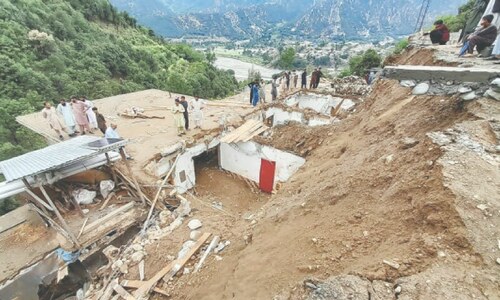ISLAMABAD, Feb 4: Pakistani investigators probing into the Mumbai attacks are closing in on a Bangladeshi connection to the terrorist strike and are said to have evidence of not only the involvement of a banned militant organisation, Harkat-ul-Jihad-al Islami, Bangladesh (HuJI-B), but also of its role in planning the attack and training the terrorists.
A reference in this regard is likely to be made in the report of the country’s premier investigation agency, FIA, that will be shared soon with India as findings of preliminary investigations.
The report is likely to indicate that the Mumbai attack was handiwork of an ‘international network of Muslim fundamentalists’ present in South Asia and spread all the way to Middle East; and may build the case for regional anti-terror cooperation.
Although contents of the report are being kept as a tightly-guarded secret by the interior ministry, sources privy to it say it would emphasise that the Mumbai incident is not strictly a Pakistan-India issue.
Pakistan’s High Commissioner to the United Kingdom Wajid Shamsul Hassan indicated in a recent interview that investigations had revealed the terrorist attack was not planned in Pakistan. “Pakistani territory was not used so far as the investigators have made their conclusions,” Mr Hassan had said in the interview. “It could have been some other place.”
He did not say which place he was referring to. However, his remarks were dismissed by both Prime Minister Gilani and Foreign Minister Qureshi as ‘hasty’.
The investigators were intensely probing, the sources said, if at least one of the Mumbai attackers was of Bangladesh origin.
A senior western diplomat confirmed this and said there was a strong possibility that one of the attackers was a Bangladeshi national.
It has already been established that Mohammed Ajmal Amir Kasab, the lone surviving gunman involved in the Mumbai attacks, was of Pakistani origin; but the identity of the other nine terrorists killed in the incident is yet to be finally determined, although India has been claiming that they were Pakistanis.
Although the Bangladesh connection has emerged quite prominently in the investigations, there are also clear indications that some of the planning for the attacks was done in Dubai and there is also an element of local Indian support. Investigators believe it would have been almost impossible to plan and execute an attack of this proportion and sophistication without the local Indian support — a fact India is shying away from.
The sources say that the two sets of questions given to India by Pakistan also touched this aspect. India has responded to only one set and that also indirectly through US Federal Bureau of Investigations (FBI), while reply to the second set of questions is awaited.
In a related development, the FBI is reported to have sought access from the Indian authorities to two militants, Fahim Arshad Ansari and Sabbauddin, who were arrested by Uttar Pradesh police some time between February and March last year for having made reconnaissance of several sensitive places and were later questioned for the Mumbai attacks.
The investigators also suggest that the attack may be remotely linked to Al Qaeda’s international terror network. It should be recalled that the HuJI-B, now being suspected of involvement in the attack, had been established in 1992 with material assistance and inspiration from Osama bin Laden’s International Islamic Front (IIF).
FIA-FBI cooperation
High-level exchange of notes between FBI and FIA, copies of which are available with Dawn, reveal that the two agencies had been actively cooperating in the Pakistani probe into the Mumbai attack.
Among other issues, the FIA had sought FBI’s assistance in getting information from Google Inc and Yahoo! regarding email accounts deccanmujahideen@gmail.com and drmoazam@ymail.com, used by the terrorists. The FBI was also requested information from Callphonex regarding the calls made or received by the attackers.














































Dear visitor, the comments section is undergoing an overhaul and will return soon.